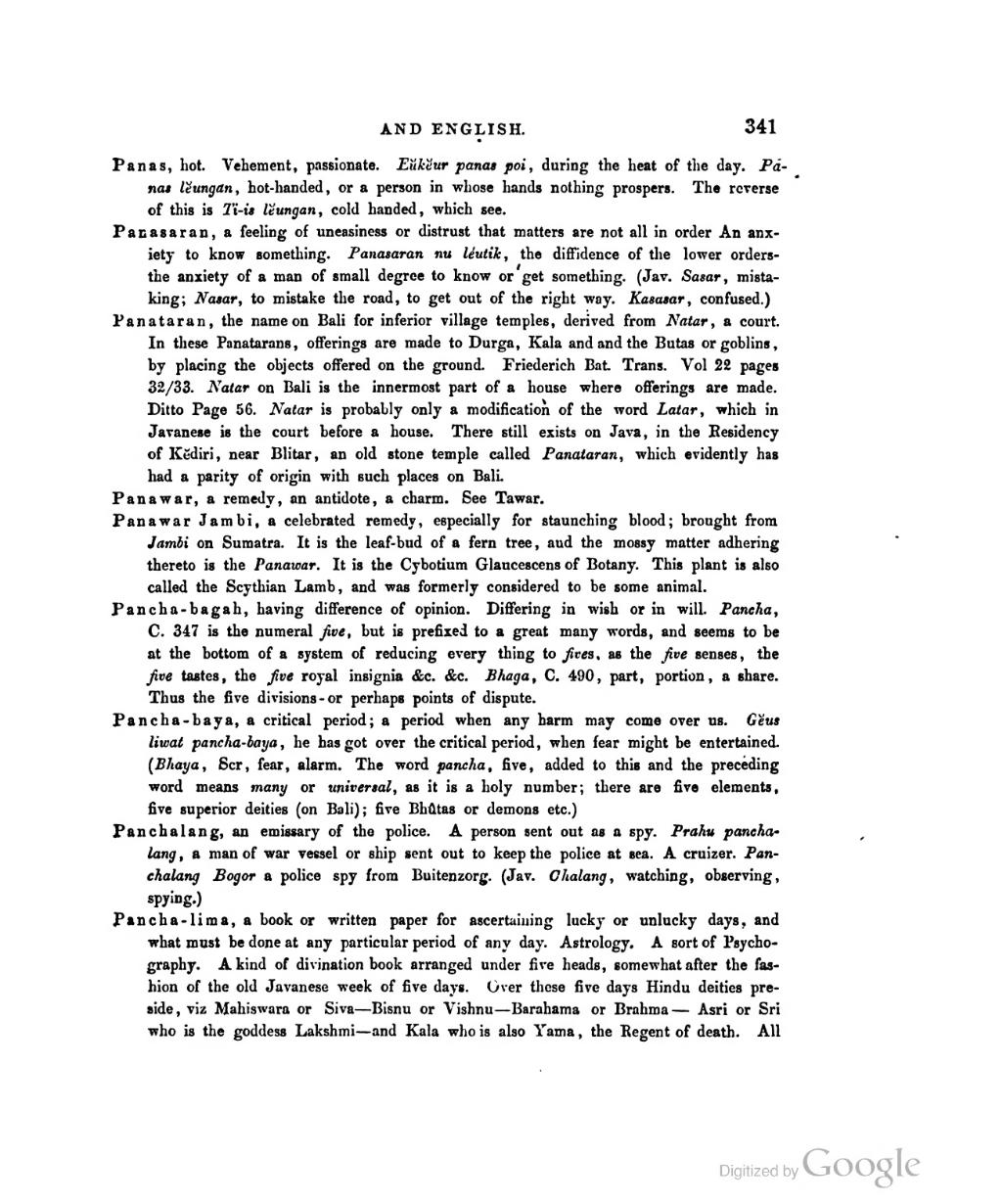Panas, hot. Vehement, passionate. Eǔkěur panas poi, during the heat of the day. Panas lěungan, hot-handed, or a person in whose hands nothing prospers. The reverse of this is Ti-is lěungan, cold handed, which see.
Panasaran, a feeling of uneasiness or distrust that matters are not all in order An anxiety to know something. Panasaran nu léutik, the diffidence of the lower orders- the anxiety of a man of small degree to know or get something. (Jav. Sasar, mistaking; Nasar, to mistake the road, to get out of the right way. Kasasar, confused.)
Panataran, the name on Bali for inferior village temples, derived from Natar, a court. In these Panatarans, offerings are made to Durga, Kala and and the Butas or goblins, by placing the objects offered on the ground. Friederich Bat. Trans. Vol 22 pages 32/33. Natar on Bali is the innermost part of a house where offerings are made. Ditto Page 56. Natar is probably only a modification of the word Latar, which in Javanese is the court before a house. There still exists on Java, in the Residency of Kědiri, near Blitar, an old stone temple called Panataran, which evidently has had a parity of origin with such places on Bali.
Panawar, a remedy, an antidote, a charm. See Tawar.
Panawar Jambi, a celebrated remedy, especially for staunching blood; brought from Jambi on Sumatra. It is the leaf-bud of a fern tree, aud the mossy matter adhering thereto is the Panawar. It is the Cybotium Glaucescens of Botany. This plant is also called the Scythian Lamb, and was formerly considered to be some animal.
Pancha-bagah, having difference of opinion. Differing in wish or in will. Pancha, C. 347 is the numeral five, but is prefixed to a great many words, and seems to be at the bottom of a system of reducing every thing to fives, as the five senses, the five tastes, the five royal insignia &c. &c. Bhaga, C. 490, part, portion, a share. Thus the five divisions - or perhaps points of dispute.
Pancha-baya, a critical period; a period when any harm may come over us. Gěus liwat pancha-baya, he has got over the critical period, when fear might be entertained. (Bhaya, Scr, fear, alarm. The word pancha, five, added to this and the preceding word means many or universal, as it is a holy number; there are five elements, five superior deities (on Bali); five Bhûtas or demons etc.)
Panchalang, an emissary of the police. A person sent out as a spy. Prahu panchalang, a man of war vessel or ship sent out to keep the police at sea. A cruizer. Panchalang Bogor a police spy from Buitenzorg. (Jav. Ohalang, watching, observing, spying.)
Pancha-lima, a book or written paper for ascertaining lucky or unlucky days, and what must be done at any particular period of any day. Astrology. A sort of Psychography. A kind of divination book arranged under five heads, somewhat after the fashion of the old Javanese week of five days. Over these five days Hindu deities preside, viz Mahiswara or Siva—Bisnu or Vishnu—Barahama or Brahma—Asri or Sri who is the goddess Lakshmi—and Kala who is also Yama, the Regent of death. All

